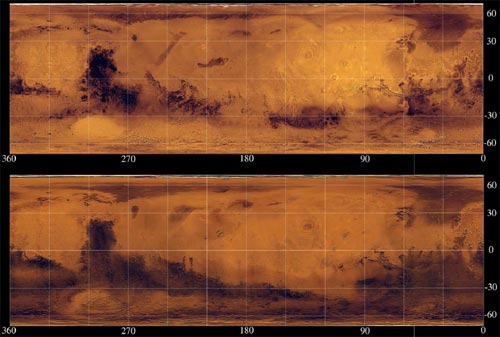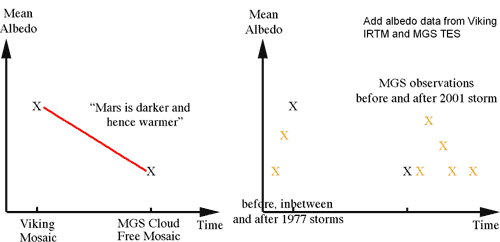Climate change on Mars
Posted on 13 March 2008 by John Cook
Global warming on Mars is a popular skeptic argument, even invoked by presidential hopeful Fred Thompson (I'm sure it had nothing to do with his failed campaign). The argument goes that Mars is warming at the same time and at a similar rate to Earth. Therefore global warming on both planets must have the same cause (eg - the sun). To determine whether this argument is valid, we need to examine the evidence that Mars is warming and what drives Martian climate.
Empirical evidence for Martian global warming
The primary empirical evidence for long term, global warming on Mars comes from Fenton 2007. Fenton compared a composite snapshot of Mars from 1977 taken by the Voyager spacecraft to a 1999 image compiled by the Mars Global Surveyor (referencing work from Geissler 2005). The 1977 snapshot showed a brighter planet. In 1999, the planet had a lower albedo, with prominent darker regions in the southern mid and high latitudes. Using the albedo changes in a general circulation model, Fenton calculated a 22 year global warming trend of 0.65°C.

Figure 1: Snapshots of Mars 1977 (top) and 1999 (bottom). Image courtesy of Geissler 2005.
Fenton attributed the warming to surface dust causing a change in the planet's albedo. Martian dust plays a major role in the planet's climate (Kahn 1992). Solar variations are not the main driver of Martian climate. Nevertheless, an important question remains: is the interpretation of long term global warming on Mars correct?
A broader view of Martian climate change
To put these results in proper perspective, an understanding of what drives Martian climate is required. Global dust storms increase the surface albedo by settling brighter dust on dark surfaces. Within a year after a dust storm, various wind systems remove the dust and Mars returns to a normal, lower albedo.
The 1977 snapshot was taken after a global dust storm had deposited dust over the southern latitudes, lightening the planet surface. Before the storm, the planet had albedo comparable to recent measurements (Szwast 2006).
Fenton drew conclusions about long term climate by comparing two end points. This led to the classic error of mistaking weather for climate (similar to the recent global cooling argument). When you look at the broader data, there is no discernable long term trend in albedo:

Figure 2: Comparison of data sampling by Fenton 2007 (left, comparing 2 end points) and the full sample of data (courtesy Mark Richardson).
The apparent long-term warming between the 1970's and 1990's is largely a consequence of the timing of the two snapshots used. The "brighter" 1977 snapshot was immediately after a global dust storm when the planet was temporarily lighter. The "darker" 1999 snapshot was of the planet in it's usual state. There is little evidence that Mars is undergoing decadal-scale, long term global warming. In fact, following the 2001 global dust storm, the southern hemisphere was brighter than in 1977 (Szwast 2006).
Conclusion
The empirical evidence isn't conclusive on whether global warming is happening on Mars. However, to answer the question on whether the sun is causing Earth's global warming, there is plentiful data on solar activity and Earth's climate. Many papers have examined this data, concluding the correlation between sun and climate ended in the 70's when the modern global warming trend began.
So the argument that Martian warming disproves anthropogenic global warming fails on two points - there is little empirical evidence that Mars is warming and Mars' climate is primarily driven by dust and albedo, not solar variations.































 Arguments
Arguments






























Now if I argued CO2 was the driving force for mid-century cooling when the data clearly shows a break down in correlation, I would be mistaken. Instead, the obvious conclusion is that some other forcing/s was driving the cooling. Similarly, we cannot conclude the sun is driving current warming because the correlation has broken down. Therefore some other forcing/s must be the driving force of the last 3 decades of warming.
The breakdown in correlation between sun and climate doesn't prove CO2 warming. It just disproves the argument that the sun is the main driver of global warming.